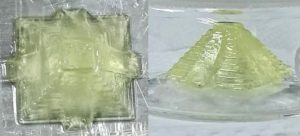Novel low toxicity photoinitiator M-QTX was launched at the 2018 Society for Biomaterials meeting in poster presentation: “3D Printing of PEG Hydrogel Scaffolds Using Novel Low Toxicity Photoinitiator” [1].
With the introduction of the concept of biological manufacturing, the application of 3D printing technology in tissue engineering and cell culture is a relevant topic. 3D printing biomaterials require biocompatibility, porosity, biodegradability and good adhesion [2]. PEG hydrogels meet these specifications, and in particular PEG acrylate (PEG-ACLT) derivatives are widely applied in hydrogel formation via photopolymerization [3. 4]. Currently, small molecule photoinitiators have a certain level of cytotoxicity, and low water solubility. We have developed a novel photoinitiator (M-QTX) that exhibits good water solubility and low cytotoxicity. Using this photoinitiator, PEG-ACLT hydrogels can be 3D printed through stereolithography into well-defined transparent three-dimensional stereograms with low toxicity and good biocompatibility.

3D printed PEG hydrogel. Precursor solution of JenKem® 8ARM(TP)-ACLT-10K, and photo-initiator M-QTX in water.
M-QTX, a novel photoinitiator with good biocompatibility, high photoinitiation efficiency and good thermal stability was developed for 3D printing of well-defined hydrogel stereograms using PEG-ACLT. Photo-crosslinkable 8ARM(TP)-ACLT-10K derivative was first dissolved in deionized water, followed by the addition of photoinitiator M-QTX. After thorough mixing, the polymer precursor solution was held for two hours protected from light until the bubbles disappeared. Well defined 3D printed hydrogels were then formed from the photopolymer solution based on Stereolithography using a Formlabs 3D printer-Form 2. The resulting 3D PEG hydrogel scaffold was transparent with a well-defined shape. This hydrogel scaffold with low cytotoxicity and good biocompatibility is suitable for 3D cell culture, tissue engineering, and organ manufacturing.
Suggested JenKem® PEG Products for 3D Printing:
| Item Code | Item Number |
| A3247 | M-QTX-2000 |
| A3246 | M-QTX-3500 |
| A9073 | 8ARM(TP)-PEG5000-b-PCL1000-ACLT |
| A9074 | 8ARM(TP)-PEG10K-b-PCL2000-ACLT |
| A9075 | 8ARM(TP)-PEG5000-b-PLA1000-ACLT |
| A9076 | 8ARM(TP)-PEG10K-b-PLA2000-ACLT |
| A8062 | 8ARM-ACLT-5000 |
| A10055 | 8ARM(TP)-ACLT-5000 |
| A8063 | 8ARM-MEACLT-5000 |
| A10056 | 8ARM(TP)-MEACLT-5000 |
| A8064 | 8ARM-MEACLT-10K |
| A10057 | 8ARM(TP)-MEACLT-10K |
| A8002 | 8ARM-ACLT-10K |
| A10021 | 8ARM(TP)-ACLT-10K |
References:
1. Wei, Z., et al., 3D Printing of PEG Hydrogel Scaffolds Using Novel Low Toxicity Photoinitiator, 2018 Society for Biomaterials poster presentation.
2. Seck, T. M., Melchels, F. P. W., Feijen, J., Grijpma,D. W., J Controlled Release. 2010; 148: 34-41.
3. Arcaute, K., Mann, B. K., Wicker, R. B., Tissue Engineering, Part C. 2011; 17: 27-38.
4. Hockaday, L. A., Colangelo, N. W., Cheung, P. Y. C., et al., Biofabrication. 2012; 4: 035005.
Founded in 2001 by experts in PEG synthesis and PEGylation, JenKem Technology specializes exclusively in the development and manufacturing of high quality polyethylene glycol (PEG) products and derivatives, and related custom synthesis and PEGylation services. JenKem Technology is ISO 9001 and ISO 13485 certified, and adheres to ICH Q7A guidelines for GMP manufacture. The production of JenKem® PEGs is back-integrated to in-house polymerization from ethylene oxide, enabling facile traceability for regulated customers. JenKem Technology caters to the PEGylation needs of the pharmaceutical, biotechnology, medical device and diagnostics, and emerging chemical specialty markets, from laboratory scale through large commercial scale.
